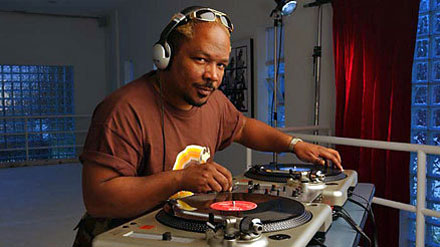
Chip E. (Irwin Larry Eberhart II, 43) was first named “The Godfather of House” by Street Mix magazine in November, 1986. His seminal Jack Trax EP, released 25 years ago, was the first record containing the words “house” and “jack.” In fact, it could be called the first true house record, since its stripped-down style doesn’t sound New Wave or disco like Jesse Saunders and Vince Lawrence’s early productions.
Chip was one of the first Chicago dance artists with a hit, but he was also one of the first artists to leave the industry over a contract dispute. In just five short years, Chip DJed high school and basement parties, worked at Importes Etc. (where all of the club and radio DJs shopped), produced a number of big records, and screened demos for D.J. International. Then he gave it all up, leaving his job at the label and refusing to make music for five years at the height of the house craze. He currently owns a video company. We spoke by phone February 5, 2010.
Jacob: How did you get into music?
Chip: I’ve always liked music. I started getting the bug—I was about twelve years old, and I saw this documentary program on PBS about this teen newspaper called New Expressions. It was a city-wide newspaper—whereas most high schools had their own newspaper, this was a newspaper that was published and distributed throughout all of the high schools in the Chicago area…. I was interested in photography. I decided, even though at the time I think I was in sixth grade, I decided that I should be on their staff. So I went down to the newspaper, and I talked to them, and I showed them my portfolio. Yeah, I had a portfolio in sixth grade.
They looked, and they said, “Oh, this is so nice, this is really cute.” You know, “Yeah, when you get in high school, yeah, you could be on the newspaper.” I was like, “Well, no, I’m kinda thinking like right now.”
After a few more visits and pestering they finally gave me an assignment, which was actually taking some pictures at St. Ignatius High School, which had just turned co-ed. That was actually the high school I planned to attend…. So I was on the staff of the newspaper, and I was there pretty much three or four days out of the week. There was a guy that did all the layout, he did all the graphic design, and his name was Eric Bradshaw. One night I was hanging out with him late, and I saw him working on some flyers…. I said, “What is that?” He said, “Oh, it’s a party I’m throwing. We have this group called Vertigo, and we throw these parties at a place called The Loft.” I was like, “Well, I can go.” He’s like, “Well, you’re a little young, but okay, come on.”
I went to this party, and it was on 14th and Michigan at a venue called The Loft. It was actually just a loft, it really wasn’t a proper venue—it was just someone’s loft with no furniture, and they threw parties there. There were a few hundred people there. Alan King was on the turntables, I remember this very vividly… and they were playing Martin Circus “Disco Circus.” I had heard some disco on the radio before, and I had older relatives who listened to disco, but I’d never heard disco like this. I’d never seen these people just dancing and sweating, and the walls were sweating, and the floor was moving up and down, and I was just in euphoria. I was like, “I love this stuff.” I think that was my first introduction to the scene, as it were.
I had this older friend, Julie Welbon, and one day we went to The Warehouse, and I think Ronnie, Ron Hardy, was guest playing with Frankie [Knuckles] there, and I heard them both spin, and I heard more new music. I said, “Where do I get this music?” She said, “Oh, there’s this great store, Importes Etc.”
By this time I was in high school. I would go to Importes all the time and buy new records, and some of my friends in high school found out that I had all the cuts. That’s what we’d call them. They were mixing music… and they’d say, “Well, why don’t you come on and bring some of your cuts by, and we can mix.” And I was like, “Cool, I wanna mix.” If I ever got to mix, it was at the end, just before they were leaving.
I just kept going back to the record store, getting more records, kept listening to them…. I had been at Importes Etc. so much that they hired me. They were like, “As long as you’re going to be here everyday, you might as well work.” By then I’d improved my DJ skills, and so I was DJing out at night. I was going to school, studying marketing and music [at Columbia College] in the daytime, for the morning portion, at least, and then the afternoons I was working at the record store, seeing how music was sold.
Where was the first place that you DJed?
I wanna say The Rink [Zone]. It was a roller rink. On Friday and Saturday nights they turned it into a disco.
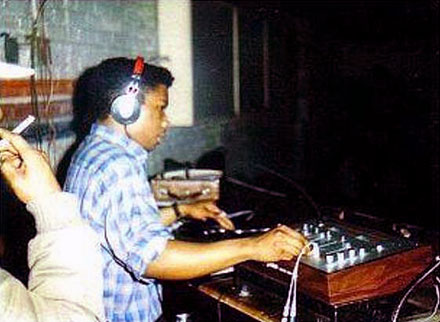
Chip E. DJing at The Rink Zone
Who were your influences DJing? Frankie Knuckles?
No, as far as DJing, my influences really were my peers. I think when the original Warehouse was open, I’d only went there once before it closed. I liked Frankie’s and Ronnie’s musical selection, but neither of them, at the time, were capable of blending or beat-matching. They played good music, but they played it like a radio DJ… well, not exactly like a radio DJ, but they would play one record, and then they would turn down the bass as they transitioned to the next record so it didn’t sound like a trainwreck. They used three-way crossovers so they could very efficiently and effectively reduce the bass from both records, but they were definitely not my DJ influences. As far as musical selection, I would say, yeah, they influenced me, but at the same time I was influencing them too, because I was working at Importes, and I was the one giving them the new music.
What kinds of things were you playing?
I was playing a lot of European disco. A lot of Doctor’s Cat, Trilogy, Lime.
How many people were working at Importes Etc.? Was it a pretty small place?
It was a pretty small place. There was myself, Paul Weisberg, the owner; Tony Mundaca was another one of the sales guys; Brett Wilcots; and Frank Sells…. Importes was primarily getting all their music from Walter [Paas]. He had a company called C.A.P. Exports. He was bringing over all the music from Europe.
How did you get into production?
I’m in a situation where I’m learning about music theory, I’m learning about marketing, I’m learning about music production, too. Obviously from my DJing experience, I was learning what makes people move. From the record store I was learning how people bought music. You’d have people coming in humming, you’d have people coming in, sometimes they’d bring a cassette recording they’d made, sometimes something they got on their answering machine, so they’d have to call their house and say, “Here, listen to this.” There were all different types of ways that people would screw up the name of a song they were looking for. Right at this time, I was learning about marketing and how to sell things. I had picked up this device from Guitar Center called a Dr. BOSS sampling pedal. It had about 1.7 seconds of sampling time on it, and it was actually made for guitar players… but I plugged the microphone into it, and I could say something, and then every time I stepped on it or hit it with my hand, I could trigger the sample. This was brave new territory.
I decided, a lot of times people don’t know the names of records, well, if I’m going to make a record… I’m going to put something in it that’s so dominant that it’s difficult for people not to know the name of the song…. One of the first songs I recorded was simply a song called “It’s House.”
I know you’ve heard a lot of stories about where “house” comes from. Actually what happened was, people would come into Importes asking for some of the old disco music that Frankie played. Now Frankie at The Warehouse never played house music, ’cause house music didn’t exist…. There was no such thing. But people would come into Importes Etc. and they would say, “Do you have any of that old music that Frankie played at The Warehouse?” Some people would just start saying, “Do you have any of that old music Frankie played at the ’house?” So we started putting up signs that would say, “As Heard at The Warehouse,” or me being lazy, I’d just put up a sign that said, “As Heard at The House,” and we’d find that anything that we put up that said “As Heard at The House,” people would just pick it up without even listening to it. So I knew this term “house” was something that was going to be marketable.
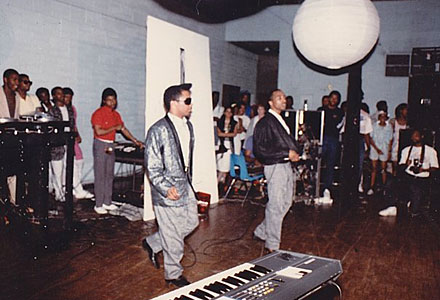
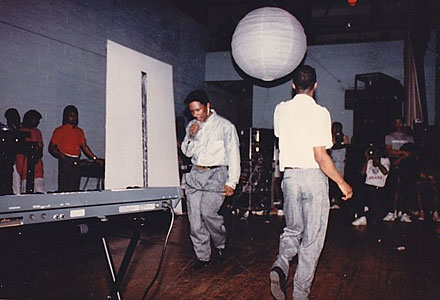
Chip E. and Keith Irving performing at Mendel Catholic Prep School
So the first record I recorded as part of my seven-track EP [Jack Trax] was a song called “It’s House,” and the entirety of the lyrics are “It’s House.” That’s it: “It’s house, it’s house, it’s house, it’s house,” just in different pitches. I put together the right rhythms behind it and some nice bass note lines and melodies, but that was the first house record.
Now Jesse Saunders claims that he created the first house record. True, he created a record before me, but it was not a house record because house music did not exist, and his record, “On and On” was a re-make of a New York disco edit. You cannot make a new genre of music by re-making a disco edit. He just re-made a disco edit, period. It was not new music. “It’s House” was completely new music. It created the genre of music we know as house, because it was minimalistic, it was tribal, it was driving, it was the four on the floor, and it was the sampling. It was based on the 808 and then later progressed into a 909 drum machine. That is the beginning of house music.
The funny thing is… even after house music started catching on in Europe, both Jesse and Vince told people they were not house music artists, they were R&B artists… until it became really big, and then all of a sudden, they were like, “Oh, yeah, yeah, we made the first house record!”
How many copies of Jack Trax did you press initially?
Our House Records was the first pressing [in 1985]. We pressed a thousand, and we sold out the first day. After I got the acetate, The Hot Mix 5 heard it in the store. I think the first person to play it was Ralphi [Rosario], and once Ralphi started playing it, they just started sharing it amongst themselves for their mixes. It played in the [WBMX radio] mixes for probably a good month before it was released, so there was a lot of interest…. When it came out, there was a line around the corner for people to get in to buy it, so it just sold out the first day. That was when I decided I was not going to work at Importes any longer….
What studio did you use?
I went out to a little studio in Villa Park called Reel to Reel. In order to be able to afford eight hours of studio time, I had to sell my coveted Technics SL-1200 MK2 turntables. It was a very painful decision.
How did you get involved with D.J. International?
While I was making “Like This” I met the people at D.J. International, and I decided to let them take over the marketing for me, because I just wanted to make music. I didn’t want to have to carry around records, doing the marketing and distribution and everything….
“Like This” was my second record…. It charted on Billboard, it was played in all the clubs, but I didn’t find out until a few years later, it was really huge in New York and New Jersey. All the Jersey comics, they’d say, if somebody got a new car, it wasn’t going on until you were bumping “Like This” in the car.
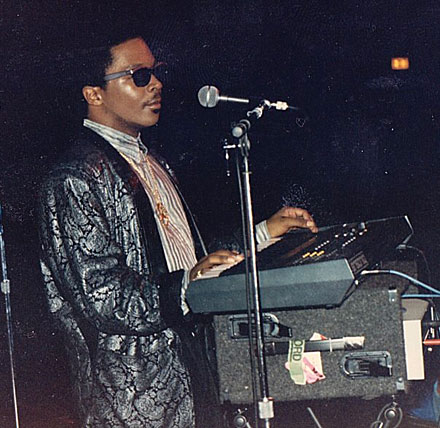
Chip E. at the Riviera Theatre, Chicago
How did you start working with K Joy?
Her father’s an art director, my mother’s a copy writer. They worked at Leo Burnett [advertising agency] together. The first time I met K Joy was around when I was in sixth grade. Both of our parents had to work on some campaign, and they had to be in the office on Saturday. K Joy and I met there, and she taught me how to make little rubber balls out of rubber cement. Years later we would meet at Kenwood [Academy] High School. We hung out a little bit, and I knew she was in choir and she sang a little bit. A common friend of ours who was a little older said, “You know, Chip, ‘It’s Time to Jack’ and ‘It’s House,’ those are cool songs, but you really can’t play ’em on the radio ’cause they don’t have any real vocals, you know?” I’m like, “Yeah, you’re right, you can only play them in the mixes….” So I’d already had “Like This” done as more of a dub track with just the drums, the bass, and the sample. I said, “Hey Kim, why don’t you write some lyrics and you can sing it.”
Were you involved in the Two of a Kind version?
All the string work that you hear on “Like This,” that was done by this young guy named Lidell Townsell. Lidell and his friend Chubby, they would play keyboards for me when I did stage shows, and Lidell did the keyboards on “Like This.” They wanted to make their own music, and I dubbed them Two of a Kind. And then behind my back they went and took an early home recording of “Like This” and sold it to Larry Sherman. Yeah, those were the days.
I read you worked for D.J. International. What was was your title?
First producer, and then I was given the title Vice President of A&R. Anybody that brought in something new, I’d listen to it….
Was Joe Smooth someone you discovered?
I actually discovered Joe Smooth when I was at Importes. Joe was a DJ [at SmartBar]. He was always coming into Importes and was telling us about some of the gear he had. Like I said, I had this little sampling pedal. He had a prototype of this keyboard by Ensoniq called the Mirage, and it was a sampling keyboard. I was like, “Really, you have one of those…. Well I got this date at the studio, why don’t you bring it by?” So he brought it by, and he helped out with Jack Trax quite a bit. Besides bringing his sampling keyboard, it’s actually Joe Smooth’s voice on “Time to Jack.” When I moved to D.J. International, I said, “This is Joe Smooth, he’s a good guy,” and he came on board.
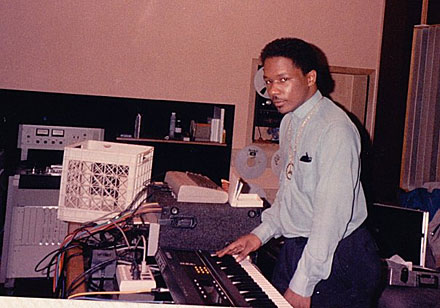
Chip E. with his Commodore 64 at Chicago Trax studio
Tell me how you wrote “Godfather of House”?
Actually, I came up with the music and the hook. My mother, who is a copy writer… I asked her if she would write a song for me, and she wrote the lyrics for it.
When did you start working with Frankie Knuckles?
This is a little trivia that a lot of people don’t know. “Like This,” I was going to do it originally myself, the sample, but I invited Frankie into the studio to say, “Like this.” But it would be years later that I would actually bring him into the studio to record his own music. About two years later… 1987, I was working on “If You Ever Knew.” I knew it was going to be a big record, and I invited Frankie in to do a mix. He was a little reluctant. He was like, “Wow, I don’t know how to do this. I know how to DJ, but I don’t know how to mix a record.” Like, “Well, here, come on, I’ll show you. It’s not that difficult.” So we showed him around the board and just let him feel his way through the song. It came off really well…. I said, “You should produce your own record. I’ll help you…. What do you want to do?” He said, “I’d really like to remake ‘You Can’t Hide’ ” [originally sung by Teddy Pendergrass].
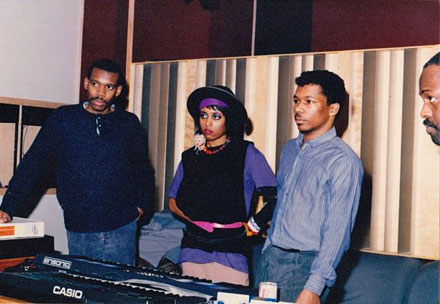
Joe Smooth, Lady Maia, Chip E., and Frankie Knuckles at Chicago Trax studio
I was at a club called AKA one night, and they had this Latin night. They had this Latin percussion and a brass section, and they were great, so I said, “I’m going to hire them to come into a studio.” On “You Can’t Hide,” that’s actually live. The drums are sampled—they’re drum machines, but all the percussion and the brass section is live-instrument.
That was the first record released under Frankie’s name, but wasn’t he working with Jamie Principle first?
That was primarily Jamie doing his thing by himself. Jamie and his girlfriend Lisa did all the lyrics.
You share credits on “Donnie” by The It for mixing, producing, lead vocals, and words and music. Larry Heard, Robert Owens, and Ron Hardy worked on the record too. How did it come to be?
There was this guy named Harry Dennis. I can’t remember how I met him or where. He kept coming by, saying, “I wanna make a record. I wanna make a record.” One morning, he caught me on a Saturday or Sunday morning after being out partying all night, and I was just frustrated. I was like, “Dude, you woke me up. Fine, you want to make a record, OK, here’s the record.” I just hopped on the keyboard, and I did the bassline for “Donnie.” I just hit a couple of black and white keys, and that was it. I was like, “There, you like that?” He was like, “Yeah, yeah! I love it!” I was like, “Come back tomorrow, we’ll sequence it, and we’ll lay it down.”
We sequenced it, we did his vocals, and then he said, “I’ve got some friends who want to help out.” Those friends would end up being Robert Owens and Larry Heard, who I’d heard of, but I hadn’t met them before that time. We brought them into the studio, and I didn’t know they were doing all of their stuff live. Larry had actually never used a sequencer before, so I showed him how to use a sequencer. Ron Hardy, by then, was a very good friend of mine, as well as Harry’s and Larry’s and Robert’s. We invited Ron to come in and mix, and the same thing as Frankie, he was a little hesitant because he’d never been in a recording studio….
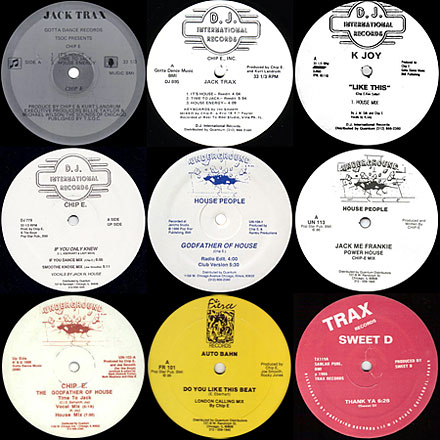
What year did you leave D.J. International?
That would have been ’87, ’88….
What was the breaking point?
The breaking point was, after “If You Only Knew” came out, there were some people at RCA Records who wanted to pick me up as an artist. I was under contract at D.J. International. They got into negotiations, and D.J. International asked for some ridiculous sum for my contract…. I just got to a point where I said, “Fuck you, if you’re going to screw up my career and you’re really not doing anything for me, if I gotta stay under contract with you, I’m just not gonna record music.” So I just stopped recording music.
You stopped altogether?
I think the contract expired ’92. Then ’92, ’93, I picked up Farley [“Jackmaster” Funk] and Adonis and we put together a group we called Godfathers Inc. We went over to the U.K. and spent some time there recording. We recorded “Was I Here Before?” with Robert Owens, and we recorded a song called “Clap Ya Hands” under the name Black Balls.
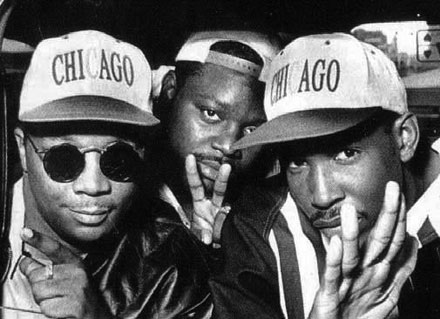
Chip E., Farley, and Adonis
Tell me about your house music documentary The Unusual Suspects.
Have you seen the movie Casablanca? If you remember, the German couriers were killed and the French lieutenant who was under German rule, he wanted to impress the Germans. So he told his sergeants and all of the other underlings, he said, “OK, go rout the usual suspects.” And that’s what I find a lot of the times when people decide they’re going to do a story on house music, they just go and round up the usual suspects. They get the people that are easy to find, and they ask them the questions that have already been asked. They don’t do any real journalism like what you’re doing. They don’t ask any tough questions or any delving questions about what really happened or do any research themselves….
How do you feel about the music scene in Chicago today?
Until we learn to truly work together, it’s really not going to improve. We’re still fighting against each other. There’s not a lot of love there like you have on the East Coast and the West Coast. For some reason, we just don’t play well together. Until we learn to do that, we’re going to stay underground. It’s just not going to flourish.
